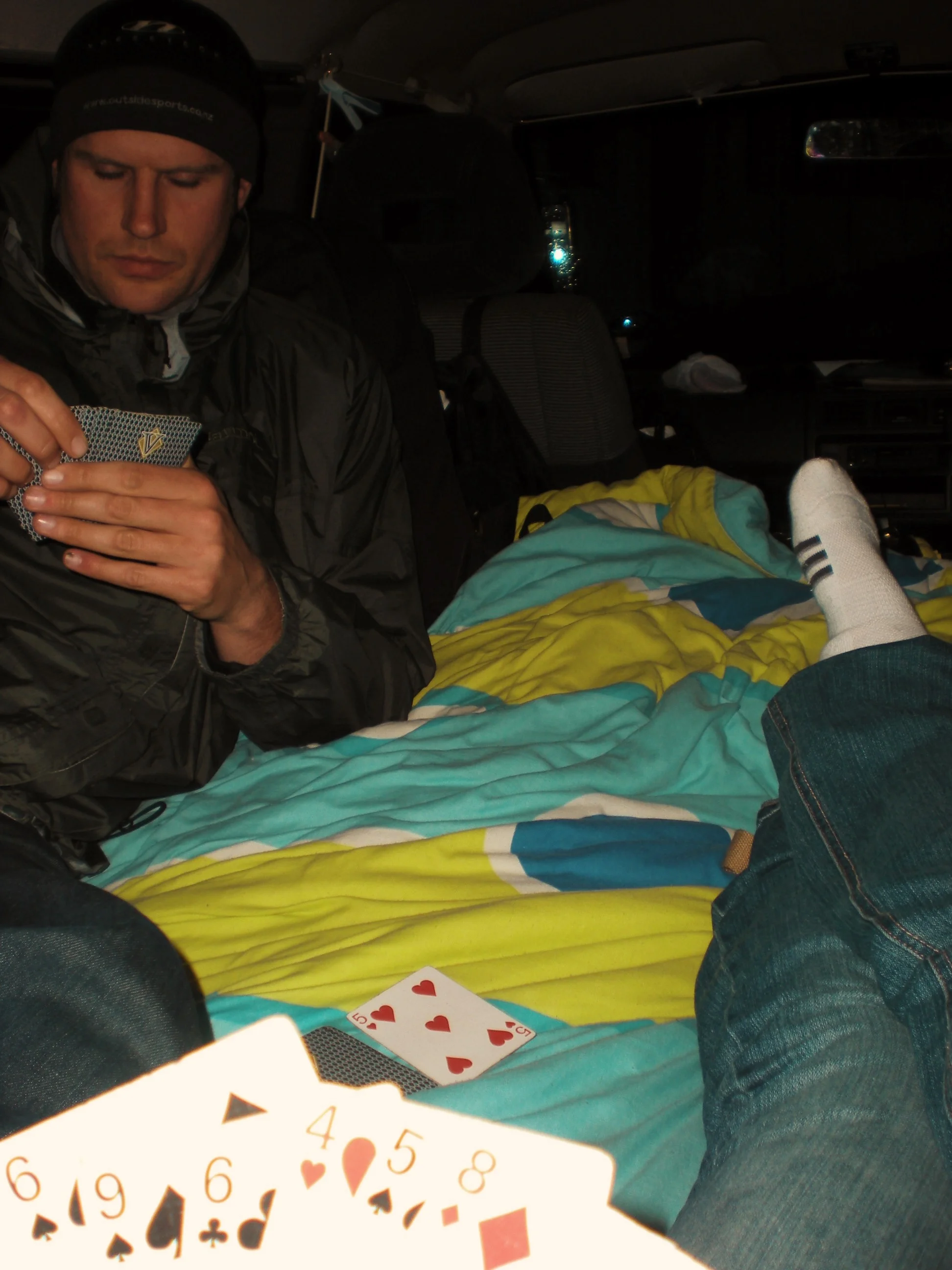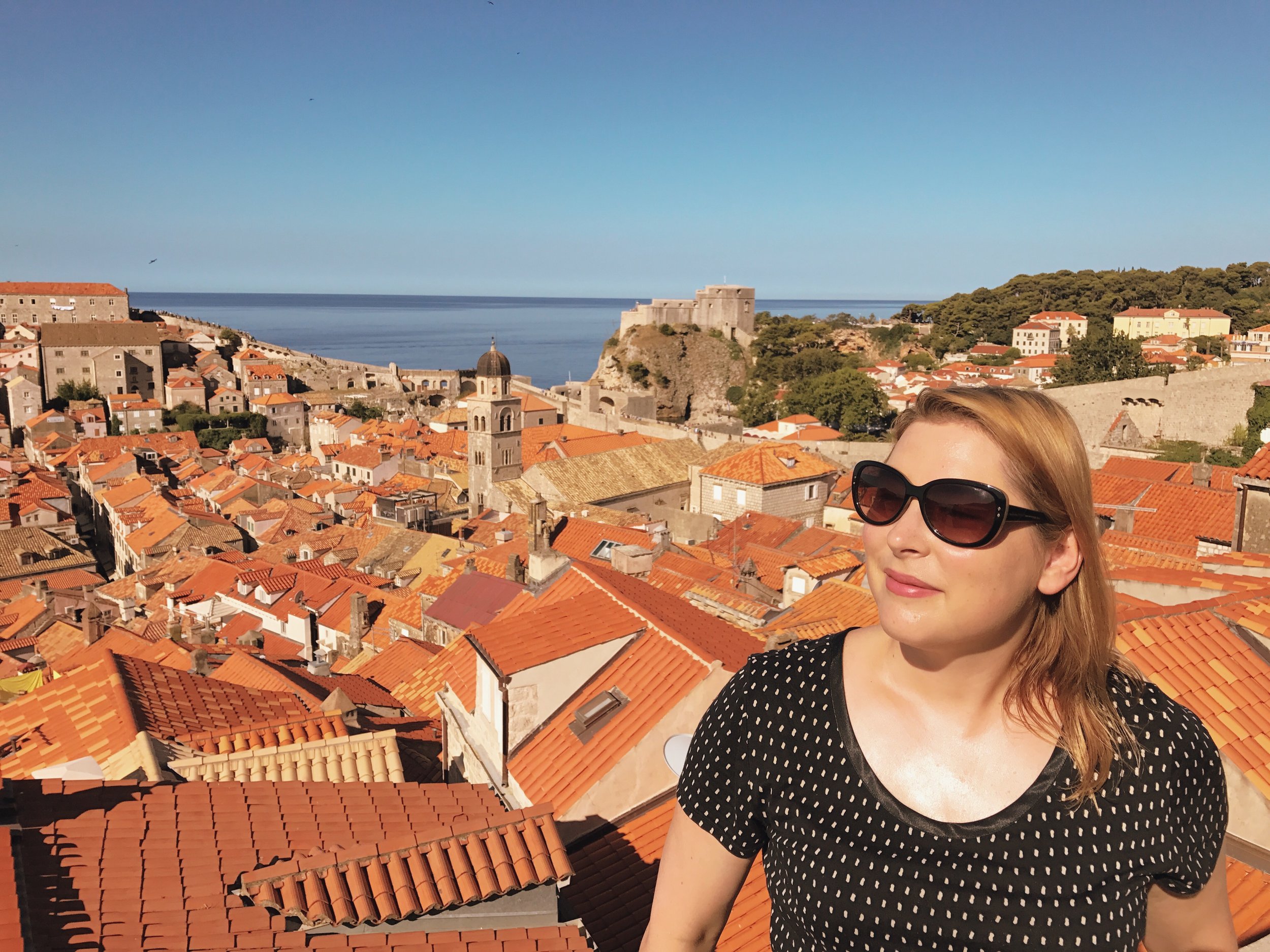#vanlife: Where to Go to the Bathroom and Other Van Life Tips and Essentials
Casey Sheppard spent two years driving around in 'Jones.'
Look up #vanlife on Instagram, and you’ll find nearly 3 million photos of perfect couples cruising through the desert or sipping beer on top of their VWs. But there are also many people who couldn't care less about Insta fame — they’re choosing to live in vans or RVs or old bread trucks because they want a simpler life. Fewer things. More experiences.
Jema Patterson lived in a van in New Zealand for a year, and in the back of a truck in the U.S. for six months. Casey Sheppard spent two years living in a van with her dog, India, before embarking on her latest adventure, biking all the way across New Zealand. On the Postcard Academy podcast, these adventurous women share all their essential tips for getting back to basics and enjoying the good life in a van. (Subscribe to the podcast to hear the whole story Apple podcasts | Stitcher | Google Play).
Why live out of a van?
Casey: I'm a jeweler and metalsmith by trade and wanted to break into the Rock n Roll industry. So I moved from Nebraska to Los Angeles and all these great things were happening and I just was not really digging it…I just couldn't get adventure out of my head. When I was a kid I really really hoped I would be Indiana Jones and I would be in some foreign land exploring unfound life or old forgotten worlds. I was 36 at the time and I’m, like, “I'm never going to do this,” and something just sparked in me…so I just traded it all in and decided to do an adventure which happened to be van life.
Jema: This is becoming a real, legit genuine thing. Like, these aren't just weirdos down by the river anymore. Jimmy Buffett's tour writer is a journalist and he lives out of a van. There's this baseball player, Daniel Norris, and in the offseason he lives out of a van. This is a way to have control over your time and attention and more and more people want to do it. They are minimalists. They just want to get rid of stuff, so they don't want to move into a smaller house. They just want to really simplify their life down to the basics.
Casey Sheppard and her dog, India, living the van life.
Where do you park the van when you’re ready to sleep?
Casey: I love campsites because there's facilities there. I have this really great app — AllStays— that a fellow traveler introduced me to that tells you about free campsites and paid campsites and it was really handy. There's the Walmart parking lots, but I'm a woman by myself. I didn't feel comfortable staying in Walmart parking lots, but I know a guy that does van life by himself and he loves the Walmart parking lots. I have parked on the street a couple times outside friends’ houses or in people's driveways.
Where do you go to the bathroom?
Jema: If you're at the grocery store, and you’ve got to go, you go. Just because you don't own a bathroom doesn't mean that there aren't bathrooms in your life. And then a lot of these vehicles…they have gray water systems, they have Black Water Systems, so they actually make these cassette toilets.
Casey: I got this She Wee thing, this female funnel thing, before I went on my trip because I was like, “Oh, you know for safety. I don't want to get out at night in some weird place.” And it was horrible. You had to, like, slow down your pee because it would overflow. And so my friend was, like, “Just go get a funnel at the hardware store.” So I went and got one of those and I’d get a water jug and drink the water and just put an X on it be like, “okay, that's the pee jug.”
This clean energy stove uses sticks and twigs to cook.
How do you cook?
Casey: I have a BioLite stove. It's a clean energy stove that uses sticks and twigs. I just never used it inside; I always cooked outside. You could rig it up to have a little stove in [the van] like a little Coleman stove, but I wanted clean energy; I didn't want to be refilling containers and have more waste.
Where do you shower?
Jema: We had an outdoor shower so if we were camping somewhere, we could set this thing out in the sun and get it hot and have our own shower. But a lot of times, we’d go to a rec center, which was great because we’d go, we’d take a shower, then we’d do our workout, then we’d take another shower. And in America, there’s truck stops. It can sound nasty, but some of the cleanest showers I've been in have been in truck stops in North America. And then public showers in New Zealand. And then sometimes, just rent an Airbnb for a night.
What other logistics should we know about? Laundry? Wifi?
Casey: I would sometimes do laundry by a stream or a go to a laundromat, which was a great place because then I could charge everything and a lot of laundromats have wifi, so I could do some work. I could charge all my stuff up and I could get clean clothes. One thing that I would love to do is outfit the van with some solar panels, and so that's one thing that I would highly recommend. BioLite makes this really great little solar panel that was great for charging smaller items.
"When it gets dark early in the winter, entertaining yourself is a challenge!" Jema says.
Was there anything that you gave away because you didn't need it?
Casey: Clothes was one thing that I cycled through because of the seasons. So, I would wear my summer clothes and then when winter hit, I would donate my clothes to Goodwill and then go and buy some new winter clothes and kind of rotate through that because I didn't have a lot of space for clothes.
What’s an item that you couldn’t live without?
Casey: My paper atlas, a paper map. That is definitely something I learned on the first day with no cellphone service: to be able to find your way, have a paper map. Also, water. Couldn’t live without water. And my dog.
What special precautions should women take when solo traveling in their vans?
Jema: A lot of the women I'm interviewing are saying they really selected a vehicle where they could access the driver’s seat if they needed to, so, not a truck or not a truck without a pass-through window, so they can get to the steering wheel and drive away if they need to. There’s places you could reach out on like Couchsurfing, and say, “I'm just looking for a safe space to park, would you mind if I parked in your driveway?”
Fuel for the road. Jema Patterson has done two stints of van life so far.
What kind of work are these van life / digital nomads doing? Do you have to be a blogger?
Jema: My version of the digital nomad life is, yes, having a blog. There are digital nomads who don't talk about their life for the entire world to voyeuristically consume. Graphic artists…writers…techies who are helping build websites. Upwork is a really cool platform to look at what's possible. You can just flick through the jobs that are posted. It's just being able to work from anywhere as long as you have a wifi connection.
Casey: Van life really opened my eyes to some different opportunities. With the metalsmithing, I used to do art shows and galleries and sell my jewelry. Then when I started doing van life, it kind of changed a little bit. I started teaching workshops, which I never thought I would do because I'm a self-taught artist and self-taught metalsmith. And so that really brought me some self-confidence that I could actually teach people how to do things…And so I really would take as many opportunities as I could and speak at and visit as many schools and art centers as possible to help kind of spread the message of living an alternative lifestyle.
OK, I’m interested in trying out the van life. What kind of van should I get? Where can I find out more info about this?
Casey: I lived in a Ford Transit Connect. I wanted to be really minimal and not spend a lot of money or get into debt. I traded my car in and my brother and I spent a couple weeks in Joshua Tree converting it — and we had no idea. I knew that I needed a bed and a workbench to make metalwork and jewelry, and storage and a place for my bike and maybe a little kitchen. But we didn't know how to do anything. So we put in this bed that would fold down, and then you could fold it back up when not in use and it would be a little workbench and there's lots of storage and a little hand sink with a hand pump and a place to put my cooler and water. And so it ended up being really great.
Jema: I realized that the big barrier to entry is getting your vehicle to live in. So we're making this website called wanderlife.co You can go there and get told when it's going to be ready, and maybe even be one of our beta testers. We want to have a map where you can see vehicles to live in, but then also get the money's worth out of the van that you have. I talked to one woman, this wolf biologist who lived in a Prius, and she’s got a lot of interesting information about how to make a table that hangs from the hatchback. And so we want to create sort of Pinterest section, but one that's very specific and that you could even look up the make and model of your car and see exactly what other people have done with it down to the measurements.
Casey kicking back inside her van and enjoying van views.
What advice would you give someone just starting out their van life?
Casey: I wish I would have known to take it a little bit slower instead of trying to conquer everything. I wanted to see so much and do so much. I booked a lot of work on the road because I was scared that I wasn't going to have enough money, and I got really burnt out because I overcommitted myself. So I wish I would have slowed down a little bit and enjoyed more.
How has van life changed you?
Casey: I'm a totally different person. I'm way more grounded and I'm just way more simple and enjoy the little things in life. I was really looking for more personal fulfillment and purpose at a deeper level than I was getting when I was in L.A. I think, actually, what I was looking for was my true self, and I didn't know that until I started van life.
If you found this article useful, please share it, and subscribe to the Postcard Academy podcast. Each week, expats and adventurers share their insider travel tips on the best food, nightlife, and cultural experiences in the most interesting places around the globe. I’m your host, Sarah Mikutel, an American who's spent the last 7 years living in, and traveling around, Europe.







